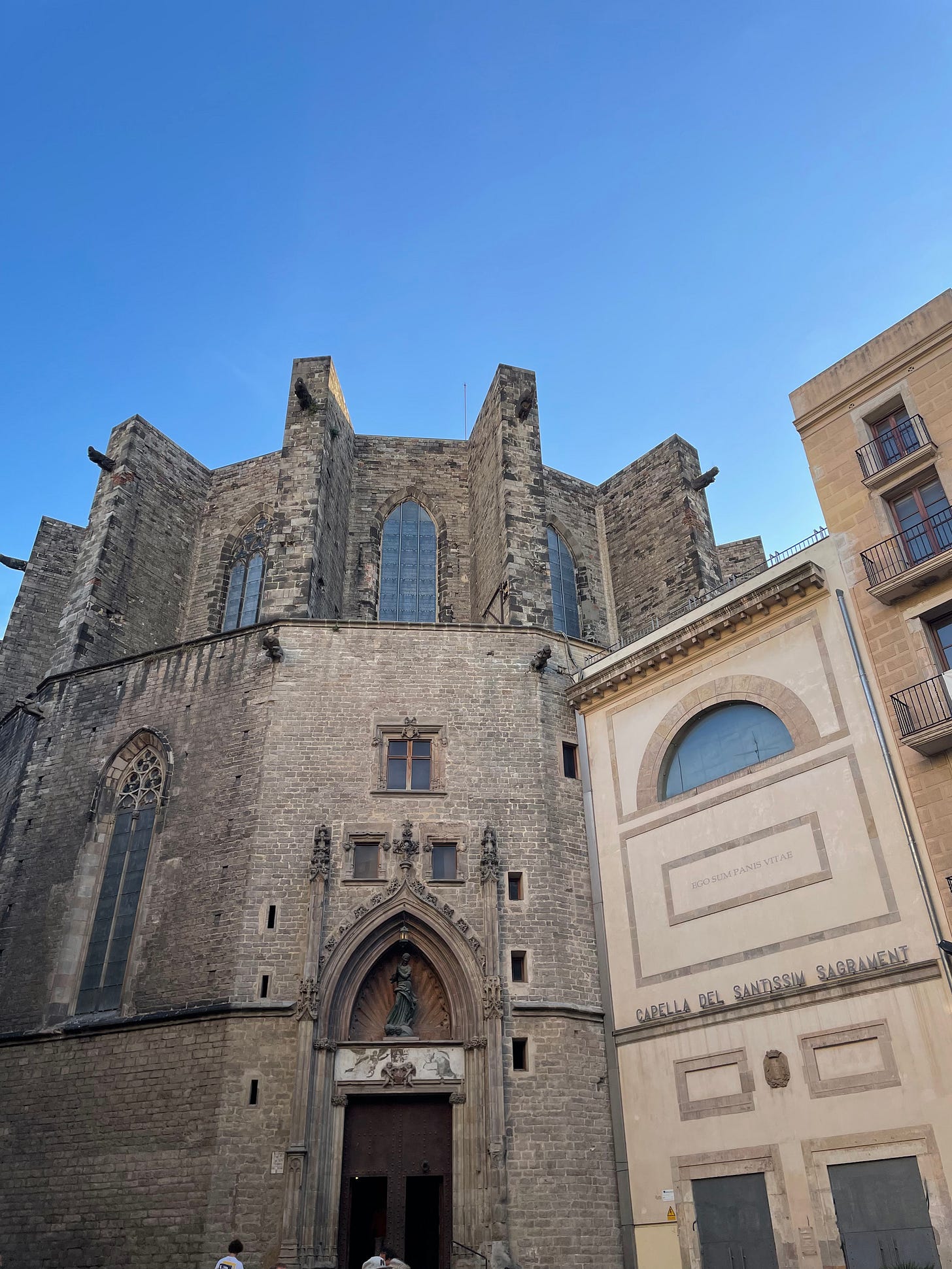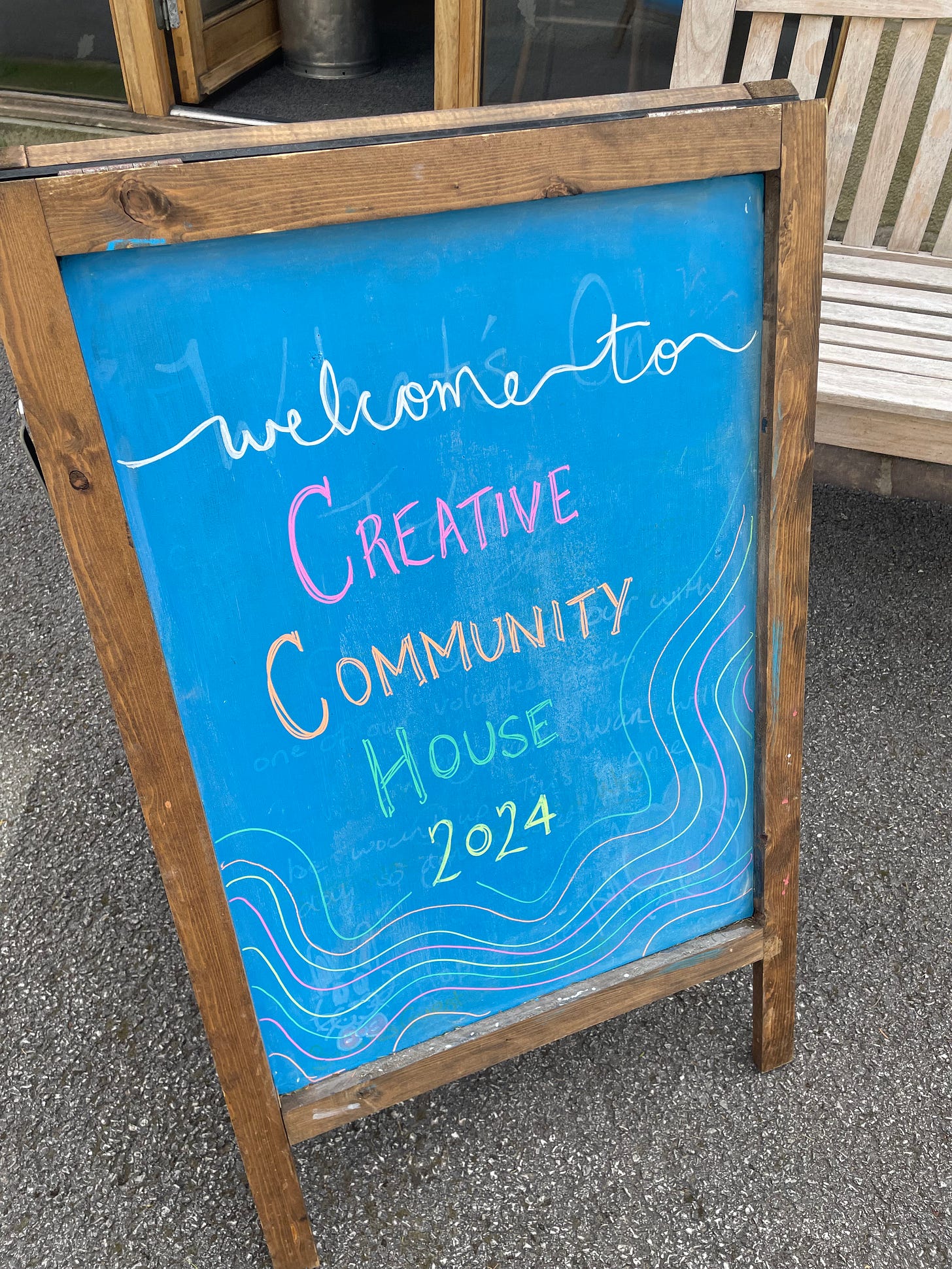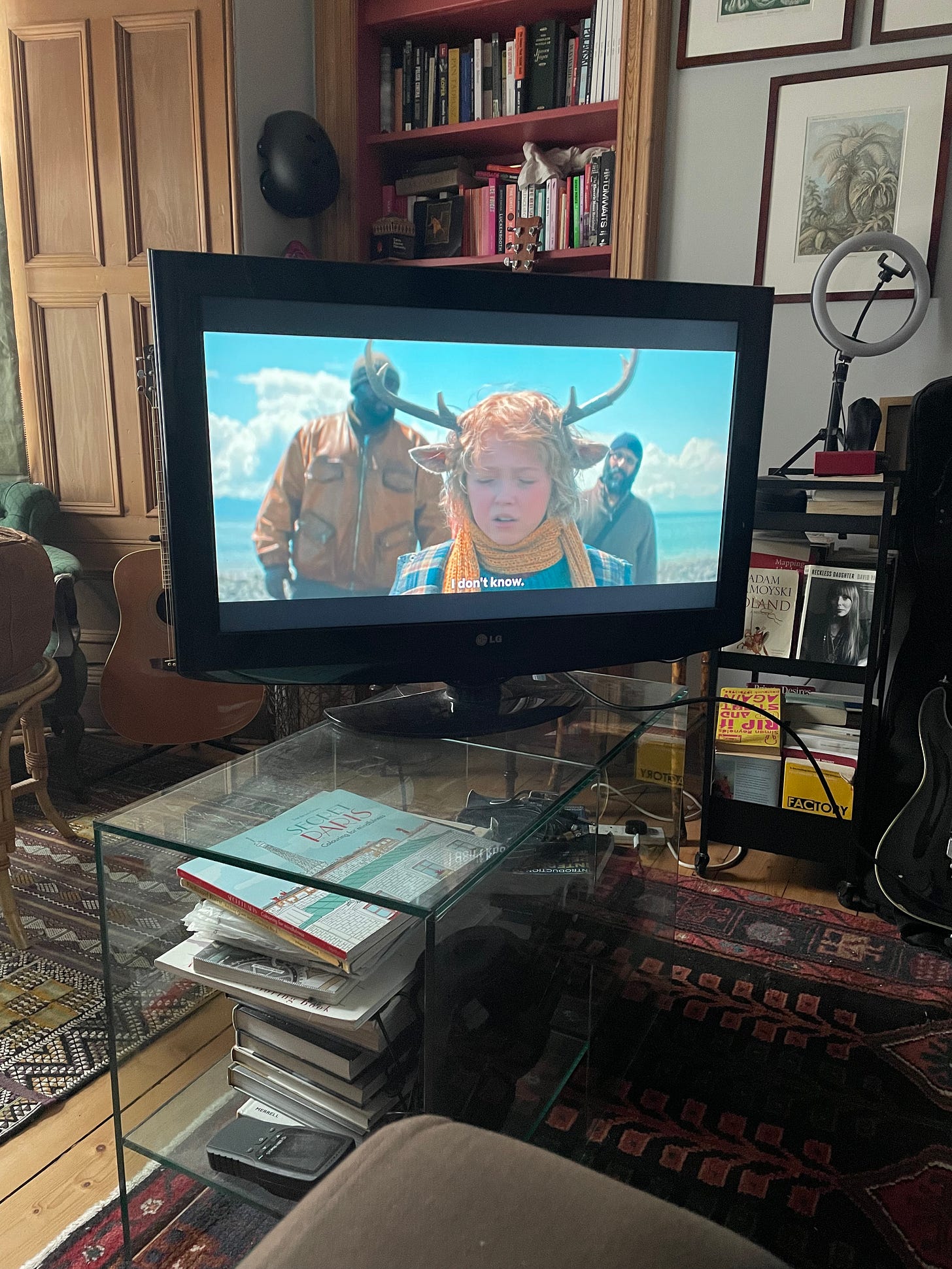Full Moons, Fast Moving Planets, and the Art of Taking Responsibility
What do we do when the world is always asking more of us?
(Pictured: Barcelona Cathedral from my trip last week. I love the rotund nature of this building and how it reminds me of the planets)
Now I am not sure about you, but these past few weeks have been wild. Gemini season started on the 20th of May, followed by a Full Moon in Sagittarius on the 23rd. For those of you who are not as familiar with astrology, Gemini season ushers in the energy of air - fast moving, fast paced, communication, these twins are a mutable energy, which is the energy between seasons that are initiatory seasons like Cardinal signs (Aries, Libra, Cancer, and Capricorn) or the stablising energy of Fixed Signs (Taurus, Leo, Scorpio and Aquarius). Mutable energy is in between. It is transitional. And, at times, it packs a punch. I have certainly felt the change this season, and the Full Moon that followed had a gorgeous energy for reviewing seeds planted six months ago in the areas of one’s birth chart that Sagittarius impacts. For me it was my health, routines, and daily rituals, as well as my work projects.
Something else happened the last week of May that emerged with a bang, and that was big revelations within the Scottish cultural sector. Whether you are chronically online or simply pick up whiffs on X threads, you may have noticed some public statements going around about people’s personal experiences working within arts organisations. Without being too explicit, these revelations sit in the wider context and backdrop of calls for the arts sector to divest from Baille Gifford, a private funder of the arts for nearly two decades. These calls have come from the Fossil Free Books campaign as well as Art Workers for Palestine, which have asked art workers to boycott and pressure organisations to divest from Baillie Gifford or other funders complicit in global harm, climate crisis, and genocide.
Now, for some art workers in the sector already worried about funding cuts, income scarcity, and the harsh realities of living under 14 years of austerity (during which period arts funding has been slowly bled dry), this scarcity-consciousness is leading to very polarised conversations about divestment. Given that arts workers sometimes feel that they can barely keep the lights on, being picky about where funding comes from is an impossibility. However, what if we took a pause and considered the possibilities of what taking this funding means, and the ways in which building a better future requires some present day sacrifice?
I am in no way saying that this is simple or easy, but activists and organisers have been providing resources, tools, information, and active support to help organisations navigate these waters. As a result, some organisations have chosen to make bold moves, like Hay Festival’s announcement at the end of last week that it would be divesting from Baillie Gifford funding.
So much of my work is behind the scenes these days, working with organisations to wade through the darker and stickier areas of their work. From supporting organisations through anti-racism reviews, to helping them consider the (very real) power dynamics within their companies and navigating very difficult disputes, I have been doing this work within the womens’ sector, arts, and third sector for the last two years. Think of it as being a gentle disruptor. By working outside of these organisations and looking in, I can help bring a different perspective and hold management to account - which brings me to the “calling out” that has been taking place across our arts sector.
In May, we commemorated four years since George Floyd’s murder. As we reflect on what has truly changed since police violence, brutality, and the impact white supremacy in action has on our society, it is important for us to think about what accountability looks like.
(Pictured: A beautiful hand painted sign from the UK Creative Community Fellows House last weekend)
I recently ran a workshop for a group of creative people somewhere in the North of England. I was invited to run a workshop on equity and leadership. I run workshops on anti-racism and intersectionality regularly, but often with organisations for whichI have some information and context. Often this work takes place in Scotland and, though I work with some networks across the UK - from policy spaces to activist networks - I rarely deliver anti-racism training outside of a Scottish context. I live in Scotland and have lived here for my entire adult life. The nuances of race, identity, and our relationship to place (where we live, breathe, and work) changes. I think it is incredibly important for someone doing work around the subtleties and nuances of peoples’ lived experiences to have a deep understanding of what it means to live in that place from their own perspective. So, rarely do I agree to take on this sort of work outside of a context with which I have some relationship to, and deep understanding of, believing that others are better placed to provide context and design sessions that incorporate those lived nuances.
As a facilitator, navigating hard questions, balancing the power dynamics in the room, paying attention to who is speaking, how often they are speaking, and seeing who needs some encouragement or space to themselves is very important. We watch body language, monitor the pace of the day, help change the tone of conversations, and have to know when to move on or when to pause on a topic a little longer. We also have to manage the energy in the room to make sure people are still engaged, or to include a break if their attention is flagging. A large part of our work is about transmuting and shifting energy. This energy comes from both ourselves and all of the other people that we are interacting with, that often we do not know and have never met before. Creating a brave space for people to be vulnerable, share, ask questions, make mistakes, get things wrong, and not make comments at the expense of others (whether that is intentional or not) is an art form. It can require years of training, expertise in managing conflict, and having techniques you can rely on when things go pear-shaped.
On the best days, it is the most motivating, inspiring, energy-giving, and beautiful thing that a person can do. It fosters spaces for growth, mutual understanding, self-reflection, deeper self-knowledge, and sometimes deeply transformational work. Things can click and fall into place. People make connections in their thinking, experiences, and ideas in ways they may have never before. People listen deeply in ways that help them understand someone else’s perspective;those perspective shifts continue to impact them, and they process their meaning for a period of time well outside of the workshop. Well-facilitated workshops and conversations unfold in layers when participants continue to unravel the insights. As a facilitator you learn so much about yourself, about how the others around you think, and you are also provided with a mirror to reflect back who you are too.
When you do deeply values-led work you can be very invested in your work, and sometimes it can be hard to give yourself distance. When you are energy sensitive and have to manage your own energy, this can also be an additional facet that you might be ‘holding’ in that space as you help people navigate through complex conversations, personal experiences, and sometimes personal traumas.
When we think about how trauma sits collectively in our bodies, psyches, spirits, and communities - as well as society more widely - how can we hold this trauma compassionately and bravely? What tools might we need to be able to explore complex issues and, as a result, hold ourselves to account? What does accountability look like, and how might we open ourselves up to the possibility of it being joyful, fun, inspiring, and beautiful?
I will share more about this soon, but I wanted to plant the seed to ask whether leaning into discomfort and exploring unknown territory is something that you are open to try?
✨Make Good Trouble News ✨
Happy Pride! Read my piece on disruption and Make Good Trouble in Somewhere For Us Magazine’s Issue 14, Spring 2024. You can buy yourself a copy here!
Do you want to hear me talk about Billie Eilish’s new album, a new reality show called Buying London, or The Big Cigar, a series about the famous Black Panther Huey P. Newton? I have some family connections to these big characters. You can hear more about it in The Tuesday Afternoon Review with Nicola Meighan. Listen to BBC sounds and play the last hour of the show. You can listen to it here!
There will be an announcement of a new book giveaway with a special partner soon. Keep your eyes peeled!
Please take photos of your books and books in bookshops wherever you see them by tagging me on Instagram (@brianapegado) with the hashtag #MakeGoodTroubleBook! I spotted Make Good Trouble at the UK Creative Cultural Community Fellows House last week.
✨ Make Good Trouble Events ✨
Make Good Trouble: A Practical Guide to the Energetics of Disruption: A Discussion at Porty Pride, Saturday 29 June 2024 at 12:30 PM at Portobello Bookshop. Join me at Catherine-Rose Stocks-Rankin discussing disruption, the tools you need to disrupt the status quo, and why this is so fundamental to Pride.
Second US Tour to be announced, with dates in Detroit Michigan, Portland Maine, and Washington, DC. Keep your eyes peeled for more information to come!
✨Special Events ✨
Inner Clarity withMarina - Marina Oswald from Talk with Marina and I are launching an incredibly special two-part workshop series called Inner Clarity.
Our values help us unearth the core of who we are. When we have clarity around our values, we understand ourselves at our deepest level and, by putting those values into practice, we can bring our lives into alignment in magical ways. This inner clarity supports an inner peace that helps us live in magical alignment with our purpose. Join us for a values workshop in two parts. Explore your values using the values compass and then learn how to put those values into practice.
The sessions will run back to back over two weeks on the 21 July and 30th of July in Edinburgh.
For newsletter subscribers please use special discount code prelaunch to book for a £33 early bird ticket. Regular tickets at £44 and early bird tickets are available until 30 June 2024.
If you are interested in hearing more about this join Marina and me for an Instagram Live next Friday 21 June to explore what this means in practice under the dim light of the Full Strawberry Moon.
Things I’ve Watched
Right, given I was recently on the Tuesday Afternoon Review with Nicola Meighan talking about Billie Eilish and sampling the reality tv drama Buying London (2024), I have honestly not been able to put it down. I’ve watched the series twice now (in between rewatching Bridgerton), also starting another ‘Buying’ series - Buying Beverly Hills (2022) - and finishing series 3 of Sweet Tooth (2021). Buying London’s drama is manufactured, and is largely based around an office quibble around whether one of the agents at Daniel Daggers’s ‘super-prime’ real estate company DDRE Global is benefitting from favouritism. In the typical misogynistic way that a woman's success is always attributed to the men around her while a man’s success is his own, this agent struggles with the rumours, gossip, and the pettiness of it all. There are truly some catastrophic relationship blunders in this series as Oliver (Oli) Hamilton is overly flirtatious with a co-worker named Juliana Ardenius. There’s a trip to Dubai and some gorgeous real estate, but if you want to hear my real opinions listen to my appearance on BBC Scotland Tuesday Afternoon!
If you want to see some real real estate, watch Buying Beverly Hills. The houses are truly exquisite and look like they are situated where they should be in warm sunny California, with all of that wall to ceiling glass, Clayworks wall work, and living green walls. The drama is even better because family members work together at The Agency, which is as utopia-cult-like as you might think. After all, everyone at The Agency is part of one big family (literally and figuratively).
(Pictured: Watching Sweet Tooth in my living room last weekend)
Last but not least, the final season of Sweet Tooth (2024) is a showstopper. I cannot say too much more, but anticipate another long journey (the ultimate journey really) to Alaska with snowy tundras, new hybrid characters, and an entire new part of this post-apocalyptic universe. Will humanity survive, or will the future lay with the hybrids? Touching, heart-warming, tear-jerking, beautiful writing, and a killer soundtrack. Are there any Enya fans in this audience? Get ready to hear ‘Boadicea’ at the perfect time in this series!





Really loved this Briana, especially your words about facilitation ❤️
Thank you so much, Nadia! I would love to hear your thoughts on facilitation too. Thank you for sharing the love for this <3